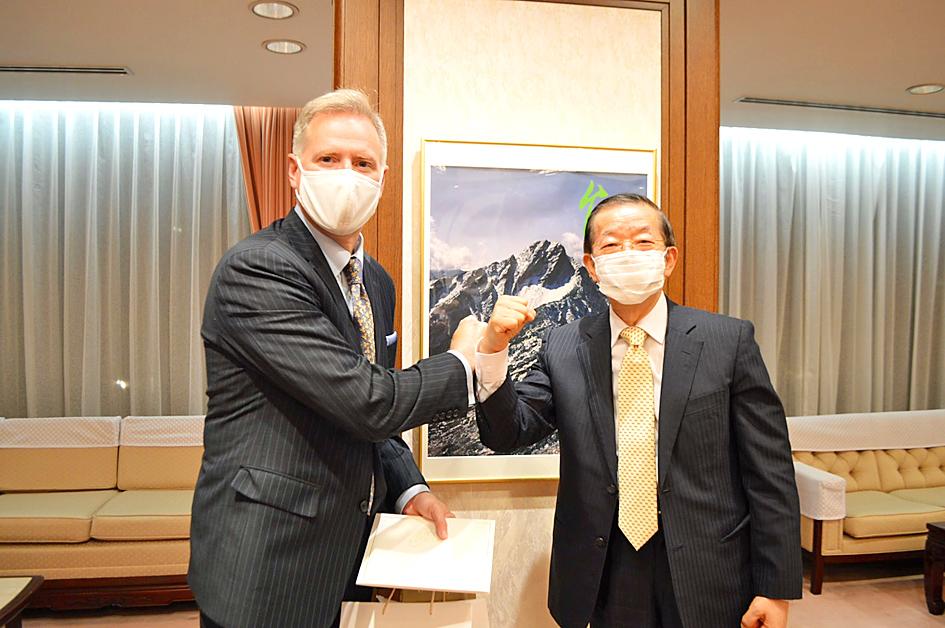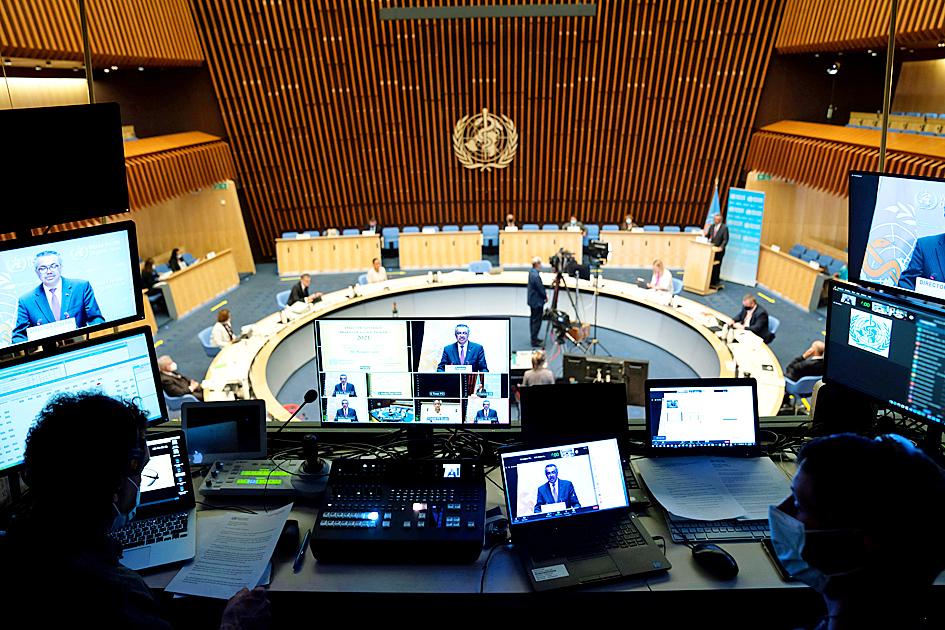The representative offices of the US, Japan and Australia yesterday issued a joint call for Taiwan’s participation in the WHO, while highlighting the importance of universal access to effective vaccinations against COVID-19.
The 74th World Health Assembly commenced virtually on Monday, but Taiwan was excluded for a fifth consecutive year.
The American Institute in Taiwan, the Japan-Taiwan Exchange Association and the Australian Office in Taipei issued a joint statement reiterating their support for “Taiwan’s meaningful participation in the work of the World Health Organization, and Taiwan’s participation as an observer in the World Health Assembly.”

Photo courtesy of the Taipei Economic and Cultural Representative Office in Japan via CNA
“Taiwan is experiencing a challenging time right now, as health authorities work diligently to counter its first significant threat from community transmission,” the statement read.
“Nonetheless, Taiwan’s early response to the emergence of COVID-19, its rigorous testing strategies, robust border measures and its information transparency remain a public health success story,” it said.
“The pandemic has highlighted Taiwan’s capacity to research, develop, produce and supply effective treatments, including some promising vaccine candidates,” it said.

Photo: Reuters / WHO
“Global monitoring and early warning systems that detect emerging infectious diseases need to be inclusive. Vaccinations need to be made available everywhere to be fully effective,” it said. “Excluding some members compromises global health and safety. It’s time to bring Taiwan on board.”
During the WHA’s sessions on Monday, Marshall Islands Minister of Health and Human Services Bruce Bilimon, St Kitts and Nevis Minister of Health Akilah Byron-Nisbett, Nauruan Minister of Health Isabella Dageago and Eswatini Minister of Health Lizzie Nkosi also called for Taiwan’s participation during two-on-two debates with the representatives of China and other countries.
Paraguayan Minister of Public Health and Social Welfare Julio Borba during a general discussion also backed Taiwan’s participation.
The Ministry of Foreign Affairs yesterday thanked the allies for voicing support for Taiwan, although their proposal pushing for Taiwan’s participation was not listed on the WHA’s formal agenda.
International cooperation is key to combating the COVID-19 pandemic, and the WHO cannot achieve its goal of “health for all” without fully including Taiwan in all of its activities, the ministry said.
In other news, Representative to Japan Frank Hsieh (謝長廷) wrote on Facebook yesterday that he had invited Joseph Young, charge d’affaires ad interim at the US embassy in Tokyo, and Japanese dignitaries to a dinner at his official residence on Monday night.
They exchanged opinions about regional peace and prosperity, as well as other issues, which is a significant “first” and a “new beginning” for the three countries to boost cooperation, he wrote.
Keiji Furuya, chairman of the Japan-Republic of China Diet Members’ Consultative Council, also attended the dinner, the ministry said, adding that it is glad to see the close interaction between the Taipei Economic and Cultural Representative Office in Japan and the US embassy.

A Chinese aircraft carrier group entered Japan’s economic waters over the weekend, before exiting to conduct drills involving fighter jets, the Japanese Ministry of Defense said yesterday. The Liaoning aircraft carrier, two missile destroyers and one fast combat supply ship sailed about 300km southwest of Japan’s easternmost island of Minamitori on Saturday, a ministry statement said. It was the first time a Chinese aircraft carrier had entered that part of Japan’s exclusive economic zone (EEZ), a ministry spokesman said. “We think the Chinese military is trying to improve its operational capability and ability to conduct operations in distant areas,” the spokesman said. China’s growing

Nine retired generals from Taiwan, Japan and the US have been invited to participate in a tabletop exercise hosted by the Taipei School of Economics and Political Science Foundation tomorrow and Wednesday that simulates a potential Chinese invasion of Taiwan in 2030, the foundation said yesterday. The five retired Taiwanese generals would include retired admiral Lee Hsi-min (李喜明), joined by retired US Navy admiral Michael Mullen and former chief of staff of the Japan Self-Defense Forces general Shigeru Iwasaki, it said. The simulation aims to offer strategic insights into regional security and peace in the Taiwan Strait, it added. Foundation chair Huang Huang-hsiung

PUBLIC WARNING: The two students had been tricked into going to Hong Kong for a ‘high-paying’ job, which sent them to a scam center in Cambodia Police warned the public not to trust job advertisements touting high pay abroad following the return of two college students over the weekend who had been trafficked and forced to work at a cyberscam center in Cambodia. The two victims, surnamed Lee (李), 18, and Lin (林), 19, were interviewed by police after landing in Taiwan on Saturday. Taichung’s Chingshui Police Precinct said in a statement yesterday that the two students are good friends, and Lin had suspended her studies after seeing the ad promising good pay to work in Hong Kong. Lee’s grandfather on Thursday reported to police that Lee had sent

BUILDUP: US General Dan Caine said Chinese military maneuvers are not routine exercises, but instead are ‘rehearsals for a forced unification’ with Taiwan China poses an increasingly aggressive threat to the US and deterring Beijing is the Pentagon’s top regional priority amid its rapid military buildup and invasion drills near Taiwan, US Secretary of Defense Pete Hegseth said on Tuesday. “Our pacing threat is communist China,” Hegseth told the US House of Representatives Appropriations Subcommittee on Defense during an oversight hearing with US General Dan Caine, chairman of the Joint Chiefs of Staff. “Beijing is preparing for war in the Indo-Pacific as part of its broader strategy to dominate that region and then the world,” Hegseth said, adding that if it succeeds, it could derail